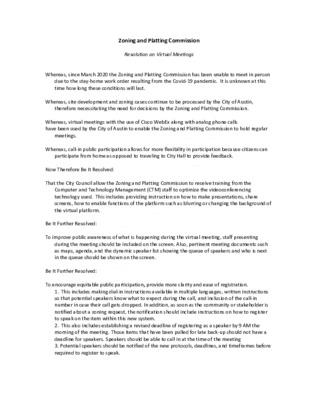C-01 (Barrera - Ramirez -ZAP Virtual Meeting_DRAFT Resolution.7.6.20) — original pdf
Backup

Zoning and Platting Commission Resolution on Virtual Meetings Whereas, since March 2020 the Zoning and Platting Commission has been unable to meet in person due to the stay-home work order resulting from the Covid-19 pandemic. It is unknown at this time how long these conditions will last. Whereas, site development and zoning cases continue to be processed by the City of Austin, therefore necessitating the need for decisions by the Zoning and Platting Commission. Whereas, virtual meetings with the use of Cisco WebEx along with analog phone calls have been used by the City of Austin to enable the Zoning and Platting Commission to hold regular meetings. Whereas, call-in public participation allows for more flexibility in participation because citizens can participate from home as opposed to traveling to City Hall to provide feedback. Now Therefore Be It Resolved: That the City Council allow the Zoning and Platting Commission to receive training from the Computer and Technology Management (CTM) staff to optimize the videoconferencing technology used. This includes providing instruction on how to make presentations, share screens, how to enable functions of the platform such as blurring or changing the background of the virtual platform. Be It Further Resolved: To improve public awareness of what is happening during the virtual meeting, staff presenting during the meeting should be included on the screen. Also, pertinent meeting documents such as maps, agenda, and the dynamic speaker list showing the queue of speakers and who is next in the queue should be shown on the screen. Be It Further Resolved: To encourage equitable public participation, provide more clarity and ease of registration. 1. This includes making dial-in instructions available in multiple languages, written instructions so that potential speakers know what to expect during the call, and inclusion of the call-in number in case their call gets dropped. In addition, as soon as the community or stakeholder is notified about a zoning request, the notification should include instructions on how to register to speak on the item within this new system. 2. This also includes establishing a revised deadline of registering as a speaker by 9 AM the morning of the meeting. Those items that have been pulled for late back-up should not have a deadline for speakers. Speakers should be able to call in at the time of the meeting 3. Potential speakers should be notified of the new protocols, deadlines, and timeframes before required to register to speak. Be it Further Resolved: That any time a speaker is inaudible or if the speaker cannot be heard for a portion of their time, time should be added to their testimony.